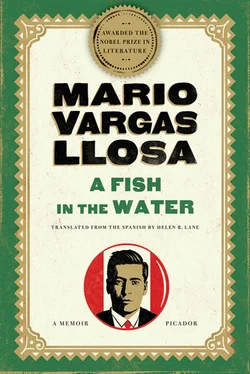Mario Vargas Llosa - A Fish in the Water - A Memoir
Здесь есть возможность читать онлайн «Mario Vargas Llosa - A Fish in the Water - A Memoir» весь текст электронной книги совершенно бесплатно (целиком полную версию без сокращений). В некоторых случаях можно слушать аудио, скачать через торрент в формате fb2 и присутствует краткое содержание. Год выпуска: 2015, Издательство: Macmillan, Жанр: Биографии и Мемуары, на английском языке. Описание произведения, (предисловие) а так же отзывы посетителей доступны на портале библиотеки ЛибКат.
- Название:A Fish in the Water: A Memoir
- Автор:
- Издательство:Macmillan
- Жанр:
- Год:2015
- ISBN:нет данных
- Рейтинг книги:3 / 5. Голосов: 1
-
Избранное:Добавить в избранное
- Отзывы:
-
Ваша оценка:
- 60
- 1
- 2
- 3
- 4
- 5
A Fish in the Water: A Memoir: краткое содержание, описание и аннотация
Предлагаем к чтению аннотацию, описание, краткое содержание или предисловие (зависит от того, что написал сам автор книги «A Fish in the Water: A Memoir»). Если вы не нашли необходимую информацию о книге — напишите в комментариях, мы постараемся отыскать её.
is a twofold book: a memoir of one of Latin America's most celebrated witers, beginning with his birth in 1936 in Arequipa, Peru; and the story of his organization of the reform movement which culminated in his bid for the Peruvian presidency in 1990.
A Fish in the Water: A Memoir — читать онлайн бесплатно полную книгу (весь текст) целиком
Ниже представлен текст книги, разбитый по страницам. Система сохранения места последней прочитанной страницы, позволяет с удобством читать онлайн бесплатно книгу «A Fish in the Water: A Memoir», без необходимости каждый раз заново искать на чём Вы остановились. Поставьте закладку, и сможете в любой момент перейти на страницу, на которой закончили чтение.
Интервал:
Закладка:
The whole family went back to Peru, but Uncle Jorge and Aunt Gaby, and Uncle Juan and Aunt Laura, went to live in Lima, which was a great disappointment to me, since it meant being separated from Nancy and Gladys, the cousins I had grown up with. They had been like two sisters to me and their absence was hard to bear during the first months in Piura.
The only ones who made that journey from Cochabamba to Piura — a long, unforgettable one in many stages, by train, boat, car, and plane — were my grandmother, Auntie Mamaé, myself, and two members added to the family through the kindness of Granny Carmen: Joaquín and Orlando. Joaquín was a youngster only a little older than I was, whom Grandfather Pedro had met on the Saipina hacienda, with no parents, relatives, or identity papers. Feeling sorry for him, he took him to Cochabamba, where he had shared the life of the house servants. He grew up with us, and my grandmother couldn’t bear the thought of leaving him behind, so he came to form part of the family entourage. Orlando, a boy a little younger, was the son of a cook from Santa Cruz named Clemencia, whom I remember as being tall and good-looking, and with hair she always wore loose. One day she got pregnant and the family was unable to find out who the father was. After giving birth, she disappeared, abandoning the newborn baby boy at our house. Attempts to discover her whereabouts came to nothing. Granny Carmen, who had grown fond of the child, brought him with her to Peru.
Throughout that entire journey, crossing the Altiplano by train, or Lake Titicaca on a little steamer that plied between Huaqui and Puno, my one thought was: “I’m going to see Peru, I’m going to get to know Peru.” In Arequipa — where I had been once before, with my mother and my grandmother, for the Eucharistic Congress of 1940—we again stayed at Uncle Eduardo’s, and his cook Inocencia again made me those reddish, very hot, highly spiced fresh shrimp stews that I dearly loved. But the highlight of the trip was the discovery of the sea, on reaching the top of “Skull Hill” and catching sight of the beaches of Camaná. I was so excited that the driver of the car that was taking us to Lima stopped so that I could dive into the Pacific. (The experience was a disaster because a crab pinched my foot.)
That was my first contact with the landscape of the Peruvian coast, with its endless empty expanses, tinged gray, blue, or red depending on the position of the sun, and its solitary beaches, with the ocher and gray spurs of the cordillera appearing and disappearing amid the sand dunes. A landscape that would always remain with me as my most persistent image of Peru when I went abroad.
We stayed a week or two in Lima, where Uncle Alejandro and Aunt Jesús put us up, and the only thing I remember about that stay is the little tree-lined streets of Miraflores, where they lived, and the roaring ocean waves at La Herradura, where Uncle Pepe and Uncle Hernán took me.
We went by plane north to Talara, for it was summer and my grandfather, thanks to his post as prefect of the departamento , had a little house there, made available to him during the vacation season by the International Petroleum Company. Grandfather met us at the airport of Talara and handed me a postcard showing the façade of the Salesian elementary school in Piura, where they had already registered me for the fifth grade. Of those vacations in Talara I remember friendly Juan Taboada, the chief steward of the club owned by International Petroleum, a head of a labor union and a leader of the APRA (Alianza Popular Revolucionaria Americana: American Popular Revolutionary Alliance) party. He also worked in the vacation house and took a liking to me; he took me to see soccer matches and, when they showed films for underaged children, to performances at an open-air movie theater whose screen was the white wall of the parish church. I spent the entire summer immersed in the International Petroleum swimming pool, reading little stories, climbing the cliffs close by and spying in fascination on the mysterious goings and comings of the crabs on the beach. But, to tell the truth, feeling lonely and sad, far from my cousins Nancy and Gladys and my Cochabamba friends, whom I began to miss a great deal. In Talara, on March 28, 1946, I turned ten.
My first encounter with the Salesian school and my new classmates was not at all pleasant. All of them were a year or two older than I was, but they seemed even bigger because they used dirty words and spoke of nasty things that those of us at La Salle, in Cochabamba, didn’t even know existed. I came back home every afternoon to the big house that was a perquisite of the post of prefect, to complain to Uncle Lucho, scandalized by the obscene words I had heard and furious because my schoolmates made fun of my highland accent and my rabbit’s teeth. But little by little I began making friends — Manolo and Ricardo Artadi, Borrao Garcés, plump little Javier Silva, Chapirito Seminario — thanks to whom I gradually adapted myself to the customs and the people of that city which was to leave such a profound mark on my life.
Shortly after entering the school, the brothers Artadi and Jorge Salmón, one afternoon when we were taking a dip in the already ebbing waters of the Piura — at the time a river in flood — revealed to me the real origin of babies and the meaning of that unutterable dirty word: fuck . It was a traumatic revelation, although I am certain that this time I silently mulled the subject over in my mind and did not go to tell Uncle Lucho about the repugnance I felt on imagining men who turned into animals, with stiff penises, mounted on top of the poor women who had to tolerate being gored. That my mother had been able to endure such an attack so that I could come into the world filled me with disgust, and made me feel that, by finding out about it, I had sullied myself and sullied my relationship with my mother and somehow sullied life itself. To me, the world had suddenly become dirty. The explanations of the priest who was my confessor, the one person whom I dared consult about this deeply distressing subject, must not have brought me any peace of mind, since the matter tormented me day and night and a long time went by before I resigned myself to accepting that that was what life was like, that men and women did together the filthy things summed up in the verb fuck and that there was no other way for the human species to continue to exist and for me to have been born.
The job as prefect of Piura was the last steady one my grandfather Pedro ever had. I believe that during the years that the family lived there, until Odría’s military coup in 1948, which brought down José Luis Bustamante y Rivero, it was quite happy. Grandpa’s salary must have been very modest, but Uncle Lucho, who was working at the Romero Company, and my mother, who had found a job in the Piura branch of the Grace Line, contributed to meeting the household expenses. The prefecture had two patios and several mucky garrets where bats nested. My friends and I explored the garrets on our hands and knees, in hopes of catching one of those winged rats and making it smoke, since we held firmly to the belief that a bat in whose mouth anyone managed to place a cigarette could be killed off with a few puffs, since it was an avid smoker.
The Piura of those days was a very small and happy place, with prosperous and good-humored hacienda owners — the Seminarios, the Checas, the Hilbcks, the Romeros, the Artázars, the Garcías — with whom my grandparents and my aunts and uncles established ties of friendship that were to last throughout their lives. We went on outings to the pretty little beach at Yacila, or to Paita, where bathing in the ocean always involved the risk of being attacked by stingrays (I remember one lunch, at the Artadi house, when my grandfather and Uncle Lucho, who had gone swimming at low tide, got stung by a ray and how a fat black woman cured them, right there on the beach, by heating their feet with her brazier and squeezing lemon juice on their wounds), or to Colán, at that time just a handful of little wooden houses built on pylons amid the vastness of that gorgeous sandy beach full of sparrow hawks and seagulls.
Читать дальшеИнтервал:
Закладка:
Похожие книги на «A Fish in the Water: A Memoir»
Представляем Вашему вниманию похожие книги на «A Fish in the Water: A Memoir» списком для выбора. Мы отобрали схожую по названию и смыслу литературу в надежде предоставить читателям больше вариантов отыскать новые, интересные, ещё непрочитанные произведения.
Обсуждение, отзывы о книге «A Fish in the Water: A Memoir» и просто собственные мнения читателей. Оставьте ваши комментарии, напишите, что Вы думаете о произведении, его смысле или главных героях. Укажите что конкретно понравилось, а что нет, и почему Вы так считаете.












